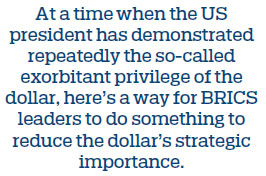The world still needs better economic BRICS
Five major emerging economies could enhance their global influence by strengthening their coordination and cooperation
Earlier this month, leaders of BRICS countries - Brazil, Russia, India, China and South Africa - met for the 11th annual meeting. Almost 18 years ago, I had the good fortune of first mentioning the phrase "BRIC" in an article calling for a better set of global governance rules. And also how the four countries should become part of major international governance organizations around the world.
The piece The World Needs Better Economic BRICs was published by Goldman Sachs, where I was chief economist in 2001. It argued that eurozone countries should probably make room to allow BRIC countries to be part of an improved G7/G8 at the center of an improved International Monetary Fund and World Bank. Subsequently, along with various Goldman Sachs colleagues I went on to show how important, economically, these countries may become for the world economy.
Nearly 18 years later, let me reflect on what has happened to this BRICS influenced world.

Many important European Union countries, especially Germany, Spain and, in particular, Italy, have very poor demographics. The same is the case with some of the more recent Eastern European members, such as Hungary. Ultimately, over the long term, economic growth is driven by two things, the size of the working population, and productivity.
If countries have weakening working populations, it makes it a lot harder for them to grow. It also means a smaller working population has to try and support an ever growing non-working population, which places additional resource constraint on governments in terms of social care, pension provision and public needs.
Without a big rise in productivity, it makes for a tricky cocktail. In this regard, and some BRICS countries, especially Russia, are feeling the pinch. China, too, is feeling the effects of shrinking demographic dividends. India, in contrast, stands out as being among the few BRICS countries where the demographics are still favorable.
Given the decline in global GDP growth, it makes sense for EU countries to think of themselves as a cohesive unit and not separate countries. And if they did this for global governance, it would give a couple of the BRICS countries, especially the larger ones like China and India, room to play a bigger role in global governance institutions.
This cohesive idea holds particularly true for Germany, France, Italy and Spain. Having been in the eurozone for 20 years now, they have shared the same common monetary policy, and, by extension, a similar framework for fiscal policy. I first wrote in my initial BRICs article in 2001 that Germany, France and Italy stop being individual members of G7 and must have joint representation. This would have made sense then, 18 years ago, and makes even more sense now.
But let me give you some more "wow" facts. The BRICS countries are collectively bigger than the EU today, and have been so for a few years now.
By the end of this year, the BRICS countries will account for some 25 percent of the global GDP, up from about 4 percent in 2001 and about 18.5 percent in 2010. This is a massive increase, the most important influence on the changes in the world economy since 2001.
But while their collective impact was big in the first 10 years, since 2010 it has remained big only because of China and India. Brazil and Russia (and South Africa) have been disappointing, economically. In fact, Brazil's share of global GDP today is slightly lower than it was in 2010, just under 2 percent, while Russia's share is just about the same, 1.7 percent.

A lot of the BRICS' economic success is, of course, because of China. In US dollar terms, China today is actually twice as large as we originally suggested it could be by 2020. We never thought it would surpass the size of Japan until 2016, but that happened before 2010, and today the Chinese economy is nearly three times bigger than Japan's. And of course, it is actually twice as big as all the other BRICS countries put together.
And to those who have been so skeptical of the others, India is on the verge of becoming bigger than France or the United Kingdom, and is likely to, by the next decade, surpass Germany, and by 2030 challenge Japan's position as the world's third-largest economy. And Brazil and Russia, because of their success in the first decade, are bigger today than we originally thought in US dollar terms.
I would like the BRICS political leaders to actually make their meeting more useful, and to further influence the world and their own economies. Here are some ideas how:
Why not announce a defined plan, supported by BRICS countries or the New Development Bank, to finance urgently needed research and incentives for new drugs to fight drug resistant TB, a problem all five of the BRICS countries share?
In the monetary field, how about announcing steps to increase holdings in each other's foreign exchange reserves? At a time when the US president has demonstrated repeatedly the so-called exorbitant privilege of the dollar, here's a way for BRICS leaders to do something to reduce the dollar's strategic importance.
And how about being really ambitious and exploring some kind of trade deal between each and all of the BRICS countries? What better way of showing the world, including many in the rest of the world who would benefit from it, that the peculiar ways of pursuing international trade now employed by the United States don't actually matter?
The author is chair of Chatham House. The author contributed this article to China Watch exclusively. The views expressed do not necessarily reflect those of China Watch. All rights reserved. Copying or sharing of any content for other than personal use is prohibited without prior written permission.
(China Daily Global 11/25/2019 page13)


















